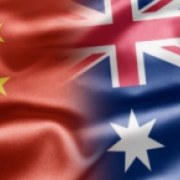Chinese SOEs in an Aussie mirror
To what extent are Mainland Chinese state-owned companies subject to political control or influence from Beijing?
The CEO of the Rio Tinto Group, Sam Walsh, provided one answer in a speech in Beijing late last year. Bemoaning the ‘misconceptions’ regarding China’s state-owned enterprises, he argued:
“Their principal shareholder happens to be a government entity, but their corporate goals and motives are largely identical to ours. They seek to run a profitable business that is internationally competitive. They worry about safety and sustainability. About productivity and costs. They juggle the need to pay dividends with the desire to reinvest for the future. There is no hidden agenda, just the same goals and concerns that occupy the directors of any western company.”
This is certainly the line that many in Beijing like to promote. It is also one that I notice many in corporate Australia dutifully repeating.
However, suggesting some sort of equivalence between the management of private companies like Rio-Tinto, and enterprises that have the state as their ultimate controlling shareholder is overstating matters considerably. It also, I think, sells Rio Tinto management short.
Management of the Anglo-Australian mining company may have made some false moves of late, but it clearly would be a very different company – less profitable and more subject to government interference – if its ultimate controlling shareholder were Beijing.
It would also, for that matter, be a very different company if it were wholly or partly owned by Canberra.
This is not mere speculation. Australia, after all, has no shortage of experience with corporations fully or partly-owned by the state – and knows well their shortcomings. All the things that people say of China’s state-owned enterprises today, they used to say of our own “national champions”.
In the 1980s directors of state-owned Qantas, the Commonwealth Bank, Telecom Australia, etc. were often well-credentialed and sophisticated people. They also sought to run a profitably business, worried about productivity and cost, and juggled the need to pay dividends. In theory, their management also had a high degree of autonomy and independence.
The reality though was that their investment and operational decisions were invariably influenced, directly or indirectly, by the government of the day: from what factories to open/close, to staffing levels, to the range of product/services provided, to the price they could charge for them, to who got to become and then remain directors of these companies.
If more evidence is required of how politics and commercial decisions clearly mix in state-owned companies then one need look no further than recent experience with Australia’s newly created behemoth, the National Broadband Network.
Even if one knew nothing about how politically charged the environment can sometimes be at the upper echelons in modern China (and it is), one would nevertheless be able to reasonably infer that Beijing does have some degree of political control or influence over its enterprises in which it is a principal shareholder. The laws of economics are, after all the same, in Shanghai as they are in Sydney.
It is true, the exact influence that the government (or, more accurately, the Party) does exert on particular decision-making varies considerably and often depends on the context – but it is rarely entirely absent and sometimes it reasserts itself at unpredictable times. A proper understanding of the mechanics of any proposed China-related deal or any on-going management China operations requires this to be taken in to account.
One does not have to believe in ‘hidden agendas’, for example, to believe that CITIC Pacific’s ill-fated Sino-Iron ore project in Western Australia was driven at least in part by national interest considerations in Beijing rather than by purely commercial objectives.
One does also not need to be conspiratorially-minded to believe that – regardless of what crimes he may have in fact committed (if any) – the timing of the prosecution of Stern Hu was suspicious and likely a tactic for increasing the negotiating position of Chinese state-owned corporates against companies like Rio-Tinto.
All that said, the fact that Beijing does exert some degree of control over its state-owned enterprises is not the same thing as saying any investment by them in Australia is or could be a threat to our national security. It is the question of national security that needs to be assessed separately and on its own merits.
Some proposals, like Huawei’s planned investment in the National Broadband Network (NBN) will be rejected because the risk is deemed too high. Others, like Chinese participation in mining projects, will pose little national security risk.
Mainland Chinese investment clearly requires a higher degree of scrutiny in any national security risk assessment because of the different nature of the regime and its uncertain political future. But this also applies to other nations that are not traditional allies and which have systems of government very different to our own like Saudi Arabia and Russia. In theory, if handled properly, we could have accepted investment from state-owned companies from Mussolini’s Italy in, say, agriculture or mining, without imperilling our national security in any way.
The only way this will not work in the long term is if our political and corporate leaders, either because of commercial interest or simply lack of reflection, start increasingly favouring Beijing-style economic or political solutions to our country’s problems. Or by pretending – when it comes to corporate and political governance in our respective countries – that there are no real differences at all.
Dan Ryan is managing director of Serica Services, a China-focused corporate advisory firm.
















